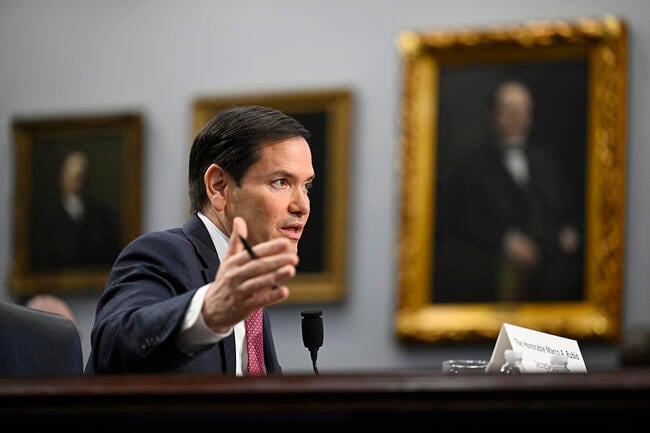You have /5 articles left.
Sign up for a free account or log in.

Secretary Rubio directed officials to intervene in the final stage of the Fulbright selection process.
John McDonnell/Getty Images
Eleven members of the 12-person Fulbright Foreign Scholarship Board have resigned over what they say is political interference in the selection process for recipients of the prestigious international grant, according to sources familiar with the program and a letter announcing their resignation Wednesday morning.
The FFSB normally has final say in the selection process, after initial application reviews by the Institute for International Education and host countries’ Fulbright commissions. This year was different. Inside Higher Ed broke the story last month that Secretary of State Marco Rubio directed State Department officials to intervene in the final stages of the selection process, adding a new step to cull proposals they felt did not comply with President Trump’s anti-DEI executive orders.
In their letter, posted to Substack on Wednesday, the former board members wrote that the State Department’s “unprecedented” intervention in the selection process was illegal and unethical and compromised national diplomatic and research interests.
“Under Democratic and Republican administrations alike, the Board has followed the law, operating with independence pursuant to its statutory mandate,” they wrote. “The current administration has usurped the authority of the Board and denied Fulbright awards to a substantial number of individuals who were selected.”
Sources familiar with the program, who spoke with Inside Higher Ed on background to avoid retaliation, said that State Department officials—led by Darren Beattie, under secretary for diplomacy and public affairs—ultimately rejected more than 20 percent of the FFSB’s selected finalists in a last-minute intervention. Of the approximately 900 approved applicants for the U.S. Visiting Scholars program, for example, Beattie vetoed roughly 200.
Many of the proposals that were cut focused on the effects of climate change or gender disparities; others seemed to have been denied based on their inclusion of words that triggered an anti-DEI keyword search that State Department officials used to conduct their final review, according to sources inside the selection process who shared details with Inside Higher Ed in May.
A person familiar with the program said the board members were stonewalled by high-level State Department officials throughout the process. When they learned that many of their selected finalists hadn’t received their acceptance letters by late May—more than a month later than anticipated—they wrote multiple letters to department officials asking for an explanation. None came; in fact, the person familiar with the program said the members only learned about the new step in the selection process from rumored communications between foreign Fulbright commissions and outside media reports.
Eventually, the person familiar with the FFSB said, the board members felt they had no choice but to resign.
The source also said that 1,200 applications from foreign faculty and researchers to the Fulbright Foreign Scholars program—all of which were reviewed and accepted by the FFSB—were still “sitting on Beattie’s desk,” and that he seemed poised to feed them through the same content filters he used on Americans’ applications.
A senior State Department official confirmed the board members’ resignations in an email to Inside Higher Ed, calling the move “nothing but a political stunt.” The spokesperson also said that the statute in the “Fulbright Hayes Act [sic]” does not give the FFSB “exclusive and final say” in the selection process, as the members argue.
“The 12 members of the Fulbright Board were partisan political appointees of the Biden Administration,” the official wrote. “It’s ridiculous to believe that these members would continue to have final say over the application process, especially when it comes to determining academic suitability and alignment with President Trump’s Executive Orders.”
The FFSB is a politically appointed board; the members who just resigned were indeed all appointed by President Biden. They include some big names in Democratic Party politics, such as Jen O’Malley Dillon, former White House deputy chief of staff and chair of the Harris-Walz campaign; Mala Adiga, Biden’s former deputy assistant; and Louisa Terrell, former White House director of legislative affairs. Others are business leaders and philanthropists.
One member, the person familiar with the program said, abstained from the board's initial vote to resign. That member appears to be Carmen Estrada Shaye, who told the Financial Times that she planned to “fulfill my term.” Shaye was appointed by President Biden in 2022.
Their resignations now open up 11 FFSB seats, which are usually term-limited, to Trump appointees. One person familiar with the Fulbright program said the board members had factored this into their decision to resign. But after being shut out from the end of the selection process, the board members felt they had to leave.
“To continue to serve after the Administration has consistently ignored the Board’s request that they follow the law would risk legitimizing actions we believe are unlawful and damage the integrity of this storied program and America’s credibility abroad,” the members wrote in their letter.
President Trump’s proposed fiscal year 2026 budget eliminates nearly all Fulbright funding and would gut the Bureau of Educational and Cultural Affairs, which houses the scholarship. The person familiar with the program said they believe the Trump administration is narrowing the funnel for Fulbright recipients and upending the selection process in order to undermine the program without eliminating it entirely, which only Congress can do.
If the administration continues unwinding the program, they said, they worry that the recently selected cohort will be left stranded without funding or resources once the new budget takes effect.
(This story was updated to reflect that only 11 of the 12 board members resigned. A previous version said the entire board quit.)





